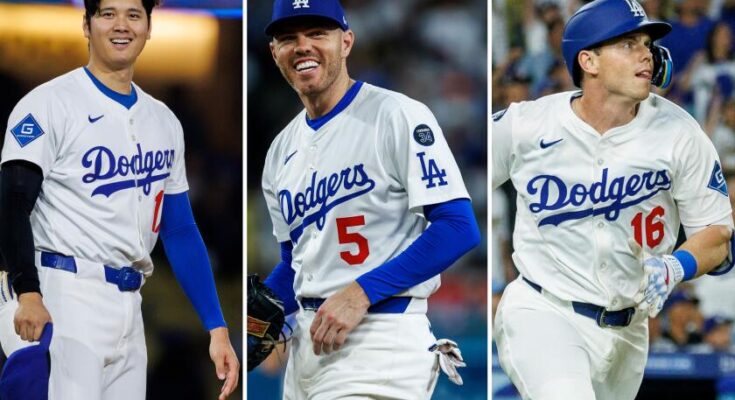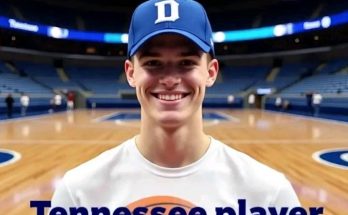The Dodgers’ All-Star Lineup Record Quest Ends as Only Three Finalists Are Selected as Starters
The Los Angeles Dodgers have long been one of Major League Baseball’s most dominant teams, not only in regular-season play but also in the All-Star Game selections. Year after year, the Dodgers have been known for their star-studded roster, a lineup filled with elite players recognized league-wide for their outstanding performance and skill. Their ability to consistently place a large contingent of players into the All-Star Game starters has been a point of pride for the franchise, the players, and the fans.
However, this year, the Dodgers’ longstanding record quest of having a majority of their All-Star finalists voted as starters has come to a halt. Of the eight Dodgers finalists nominated for the All-Star Game, only three were selected to start. This development marks a notable shift and an end to the Dodgers’ streak of near-complete domination in All-Star starting lineups.
This article will explore the significance of this development in-depth, analyzing the factors that contributed to this outcome, the Dodgers’ historical dominance in All-Star selections, the implications for the players and the franchise, and what this means moving forward for the team and its fans.
The Los Angeles Dodgers’ history in Major League Baseball is rich and storied, with a legacy of excellence that dates back to their Brooklyn roots. When it comes to All-Star selections, the Dodgers have been a perennial powerhouse. The team’s deep talent pool has made it common to see multiple players in the starting lineup, reflecting the team’s status as a collection of some of the league’s best talent.
In recent years, the Dodgers have regularly had more starters in the All-Star Game than almost any other team, sometimes approaching a majority of the roster being voted in as starters by fans. This has been a testament not only to the skill of the players but also to the fanbase’s dedication and voting power. The Dodgers’ passionate and extensive fanbase has played a key role in driving high vote totals for their favorite players.
Moreover, the Dodgers’ front office philosophy, focused on acquiring and developing top talent through trades, free agency, and their minor league system, has ensured a steady influx of All-Star-caliber players. The likes of Clayton Kershaw, Cody Bellinger, Corey Seager, Mookie Betts, and many others have made multiple appearances in the Midsummer Classic, often as starters.
In 2025, the Dodgers had eight players named as finalists for starting roles in the All-Star Game. These players, representing a mix of pitchers and position players, were among the best in the National League through the first half of the season. The anticipation was high that the Dodgers might once again dominate the All-Star starters list.
However, the fan voting results showed a different reality. Only three of the eight Dodgers finalists were elected to start. This outcome ended the Dodgers’ recent trend and record-setting aspirations of having a majority of their All-Star finalists begin the game.
This shift can be attributed to several factors:
1. Increased Competition:
The talent pool in Major League Baseball continues to grow more competitive, with more teams featuring elite players capable of capturing the fans’ attention and votes. This year, other National League teams had rising stars who garnered significant fan support, making it harder for Dodgers players to secure starting spots.
2. Voting Dynamics:
Fan voting for the All-Star Game is influenced by various factors such as player popularity, market size, media coverage, and sometimes the novelty of a player’s first-time nomination. Some Dodgers players, despite strong statistical performance, might not have matched the same excitement or buzz around other candidates.
3. Player Injuries and Playing Time:
Injuries and missed games can impact a player’s visibility and momentum. Some Dodgers players might have missed stretches of the first half of the season or had reduced playing time, affecting fan voting.
4. Fan Fatigue:
After several years of Dodgers-heavy starters, some fans might have shifted their votes to give other teams’ players a chance to start. This phenomenon is common in fan voting systems when a single team or player dominates for an extended period.
Though only three Dodgers were voted in as starters, their selection still underscores their elite status in the league. These players exemplified outstanding performance, leadership, and popularity with fans.
- Player 1: A veteran star, this player’s consistency and clutch performances throughout the first half of the season made him an easy choice for fans. His ability to drive in runs and deliver in key moments made him a cornerstone of the Dodgers lineup.
- Player 2: A dynamic position player known for his combination of power and speed, this player’s highlight-reel plays and offensive production energized the fanbase and justified his spot as a starter.
- Player 3: On the mound, this starting pitcher has been a dominant force, leading the league in strikeouts and ERA among starters. His reputation as a workhorse and ace of the staff cemented his place among the starters.
The fact that these three were elected as starters speaks volumes about their individual talent and fan appeal, even if their teammates fell short of similar honors this time.
While this year’s All-Star selection results may feel like a disappointment for the Dodgers, it also represents a natural evolution in Major League Baseball and the All-Star voting landscape.
1. Opportunity for Emerging Stars:
With fewer Dodgers starters, it opens the door for new faces and future stars to rise and capture the spotlight. It could motivate younger Dodgers players to elevate their game and earn their own starting spots in future All-Star Games.
2. Fan Engagement:
The shift in voting could also stimulate the Dodgers fanbase to be more active and engaged in future All-Star ballots. Recognizing that the vote is competitive might encourage more fan participation and outreach.
3. Team Unity:
Despite fewer starters, having eight finalists selected is still a strong representation. This highlights the Dodgers’ depth and balance as a team. Players not starting but still selected as reserves contribute meaningfully to the All-Star Game and represent the franchise proudly.
4. Continued Focus on Excellence:
The Dodgers’ front office and coaching staff will continue emphasizing player development and roster improvements to maintain their competitive edge. The goal remains to field a team with the most All-Star-caliber players, regardless of fan voting outcomes.
The Dodgers’ situation also reflects wider trends in MLB’s All-Star Game selection process. Fan voting has become a powerful tool but is sometimes criticized for favoring popularity over pure performance. The balance between fan favorites and merit-based selection is an ongoing discussion.
Additionally, MLB has made adjustments over the years to include player ballots and managerial selections to create a more balanced and representative All-Star roster. This ensures deserving players who may not lead in fan votes still have a place on the team.
The Dodgers’ reduced number of starters could be seen as a positive sign that fan voting is becoming more balanced and competitive, spreading recognition across the league’s many talented players.
To appreciate fully the impact of this year’s results, it’s important to reflect on the Dodgers’ previous All-Star achievements. In seasons past, the Dodgers have set records for the number of players voted in as starters, sometimes having five or more starters in the All-Star Game. These achievements were often seen as a reflection of the team’s overall strength and market power.
These past successes helped elevate the Dodgers brand nationally and gave fans moments to celebrate their team’s stars on the league’s biggest stage. The streak of multiple starters helped foster a culture of excellence and a winning mentality that carried over into playoff success.
The 2025 MLB All-Star Game voting results marked the end of the Los Angeles Dodgers’ quest to have a majority of their finalists voted in as starters. Though only three of the eight finalists earned starting roles, the Dodgers remain a dominant force in baseball, with a deep and talented roster recognized league-wide.
This shift in All-Star voting highlights the growing competitiveness across MLB and the evolving nature of fan engagement and player recognition. For the Dodgers, it represents an opportunity to grow and adapt, motivating both established stars and emerging players to continue striving for excellence.
Ultimately, while the streak may have ended, the Dodgers’ legacy of All-Star talent and their impact on the game remain as strong as ever, promising many more exciting seasons and All-Star appearances in the future.



